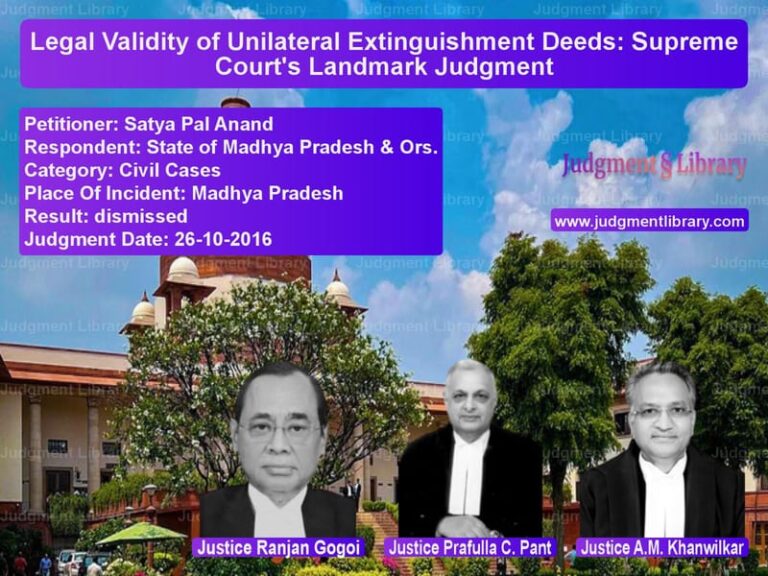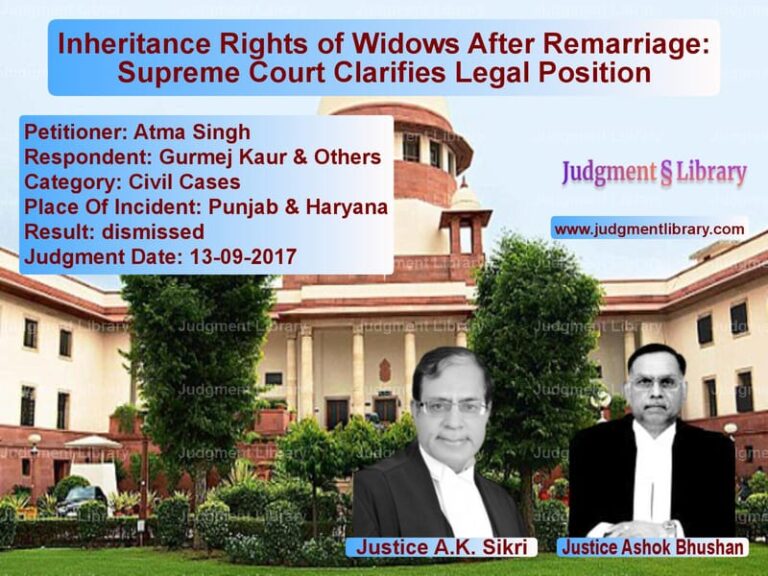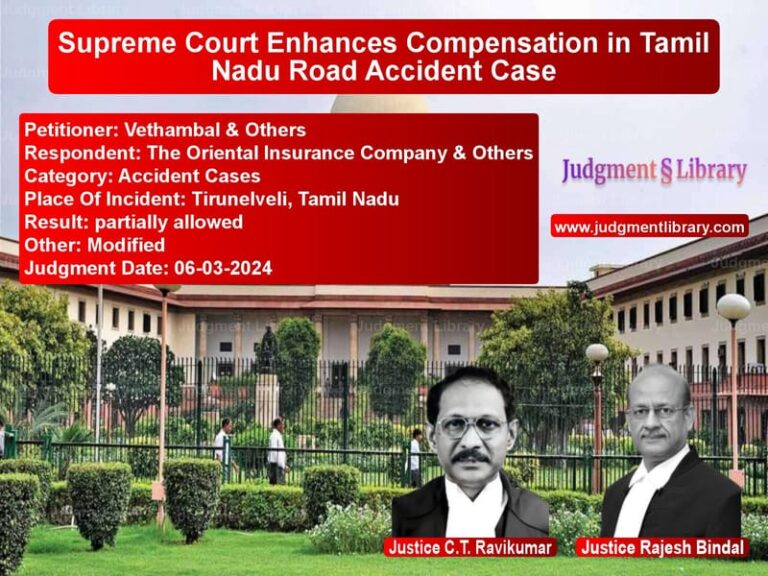Murder Conviction Restored: Supreme Court Reverses High Court Acquittal in Himachal Pradesh Case
The Supreme Court of India, in the case of State of Himachal Pradesh vs. Raj Kumar, overturned the acquittal of the respondent, reinstating the conviction under Section 302 IPC for the murder of Meena Devi. This judgment underscores the importance of circumstantial evidence in criminal cases and clarifies the principles governing the burden of proof in homicide cases.
Background of the Case
The case revolves around the tragic death of Meena Devi, who was last seen alive in the company of the accused, Raj Kumar, in their joint family home. Her body was later discovered hanging from a pine tree in the nearby forest. The prosecution alleged that Meena Devi was murdered, and her body was hung to stage a suicide. The accused was convicted by the trial court and sentenced to life imprisonment, but the High Court acquitted him, citing inconsistencies in the prosecution’s case.
Key Legal Issues
- Was the case against the accused based on credible circumstantial evidence?
- Did the High Court err in disregarding crucial witness testimonies?
- What is the legal standard for convicting an accused in cases based on circumstantial evidence?
Prosecution’s Case
The prosecution presented the following evidence to establish the guilt of the accused:
- Eyewitness testimony from the victim’s son, Jeewan Lal (PW-1), who stated that the accused assaulted his mother on the night of 23.08.2007 and later took her away.
- Testimony from Bhindra Devi (PW-15), the victim’s sister-in-law, who confirmed that Meena Devi frequently complained about the accused’s physical abuse.
- Medical evidence from Dr. Vivek Banyal (PW-24), who concluded that the victim’s death was due to “hemorrhagic shock caused by the rupture of the spleen, with anti-mortem injuries suggesting gagging.” The post-mortem report confirmed that the hanging occurred after death.
- The accused failed to report Meena Devi’s disappearance, raising suspicions.
- The accused had a clear motive—his financial interest in a fixed deposit belonging to the deceased and a land dispute involving the victim.
Defense’s Arguments
The accused denied all allegations and claimed innocence. The defense pointed out inconsistencies in the statements of prosecution witnesses and argued that the case was based on conjecture rather than solid evidence.
Trial Court’s Judgment
The trial court found the accused guilty, holding that:
- The accused was the last person seen with the deceased.
- The medical evidence suggested homicide rather than suicide.
- The accused’s failure to provide any plausible explanation regarding the victim’s disappearance pointed to his guilt.
Based on these findings, the trial court convicted the accused under Section 302 IPC and sentenced him to life imprisonment.
High Court’s Acquittal
On appeal, the High Court set aside the conviction, reasoning that:
- There were inconsistencies in the testimonies of key witnesses.
- No direct evidence linked the accused to the murder.
- The prosecution had failed to establish a clear motive.
Supreme Court’s Analysis
The Supreme Court, after thoroughly reviewing the evidence, found that the High Court had committed a grave error in acquitting the accused. The Court held:
- “In a case based on circumstantial evidence, the circumstances from which an inference of guilt is drawn must be cogently and firmly established.”
- “All the circumstances taken cumulatively should form a complete chain and must be inconsistent with any hypothesis of innocence.”
- “The accused’s failure to offer a reasonable explanation regarding the victim’s disappearance was a significant factor pointing to his guilt.”
- “The High Court disregarded crucial evidence, including medical reports and witness testimonies, without justifiable reasons.”
Judgment and Conclusion
The Supreme Court reinstated the trial court’s conviction and ordered the accused to serve his life sentence. The ruling reinforces the principle that in cases of circumstantial evidence, courts must ensure that all circumstances form a complete chain of guilt and that an accused cannot escape liability simply by remaining silent.
Don’t miss out on the full details! Download the complete judgment in PDF format below and gain valuable insights instantly!
Download Judgment: State of Himachal Pr vs Raj Kumar Supreme Court of India Judgment Dated 08-01-2018.pdf
Direct Downlaod Judgment: Direct downlaod this Judgment
See all petitions in Murder Cases
See all petitions in Judgment by R. Banumathi
See all petitions in Judgment by Uday Umesh Lalit
See all petitions in allowed
See all petitions in supreme court of India judgments January 2018
See all petitions in 2018 judgments
See all posts in Criminal Cases Category
See all allowed petitions in Criminal Cases Category
See all Dismissed petitions in Criminal Cases Category
See all partially allowed petitions in Criminal Cases Category







